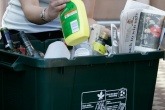European countries at risk of missing 2020 recycling target
Fourteen countries have fallen behind in the EU's ambitious 2020 recycling plan, environmental consultancy Eunomia Research and Consulting has found in a new report.
Eunomia’s new report, produced for the European Commission Directorate-General for Environment, reviewed how all member states are progressing towards the EU’s 2020 recycling targets.
The EU has set a municipal waste reuse or recycling target of 50 per cent in two years’ time for all member states, but over a dozen countries are at risk of not accomplishing this goal. The countries at risk are: Bulgaria, Croatia, Cyprus, Estonia, Finland, Greece, Hungary, Latvia, Malta, Poland, Portugal, Romania, Slovakia and Spain.

Each blueprint varies according to nation, but all are designed to push the nations towards the 2020 goals within the next few years. Some examples of how to improve include:
- More effective separate collection of waste to ensure recycling remains high quality;
- Improving operations of Extended Producer Responsibility schemes;
- Economic instruments such as landfill and incineration taxes; and
- Improved data quality.
Tim Elliott, Principal Consultant at Eunomia, led the report. He said: “The action plans, along with EU funds, are key mechanisms through which the Commission offers support to member states to achieve their recycling targets. The Cohesion funds should be targeted at actions higher up the waste hierarchy than they currently are if targets are to be met. The Commission’s Structural Reform Support Service (SRSS) can support member states to make fundamental changes in their strategic approach, such as those proposed in the action plans.”
He also expressed hope for meeting the goals as he continued: ”What’s really promising is some members highlighted in this study are already taking action - for example, we are currently supporting Finland implement certain recommendations from their plan.”
Eunomia led a Czech deposit scheme and EU product circularity project in July, and will also be leading an upcoming Welsh investigation into marine litter with Keep Wales Tidy and the Marine Conservation Society.
And yet, a wide range of issues with waste management pervade Europe, all of which make the 2020 EU targets a tough challenge.
Landfill is still common across Europe, with reports from 2016 stating that the average landfilling rate for municipal waste in the EU stood at 24 per cent. In 10 states, it was over 50 per cent, and in five, rates were reported to be over 70 per cent. There have been proposals to withdraw the funding for residual waste treatment so that member states would be able to focus their efforts on waste strategies and move away from landfill and incineration.
Commissioner for Environment, Maritime Affairs and Fisheries, Karmenu Vella, said: “With the EU waste rules recently adopted by the European Parliament and by the Council of Ministers, Europe can become the global front runner for modern waste management and further develop its circular economy.
“There are still differences across Europe, but progress is necessary and possible in the respective national and local authorities implement the actions identified in this report. The Commission is there to help by offering technical assistance, structural fund support and support in the exchange of best practices.”
There are also even more challenging targets on their way: in 2025, the Waste Framework Directive has set a target of 55 per cent of municipal waste to be recycled, increasing to 60 per cent by 2030 and 65 per cent by 2035. Alongside these goals, the Packaging and Packaging Waste Directive introduces a new plastic packaging recycling target of 55 per cent to be reached by 2030.
To find out more about the EU targets, visit the European Commission website.









